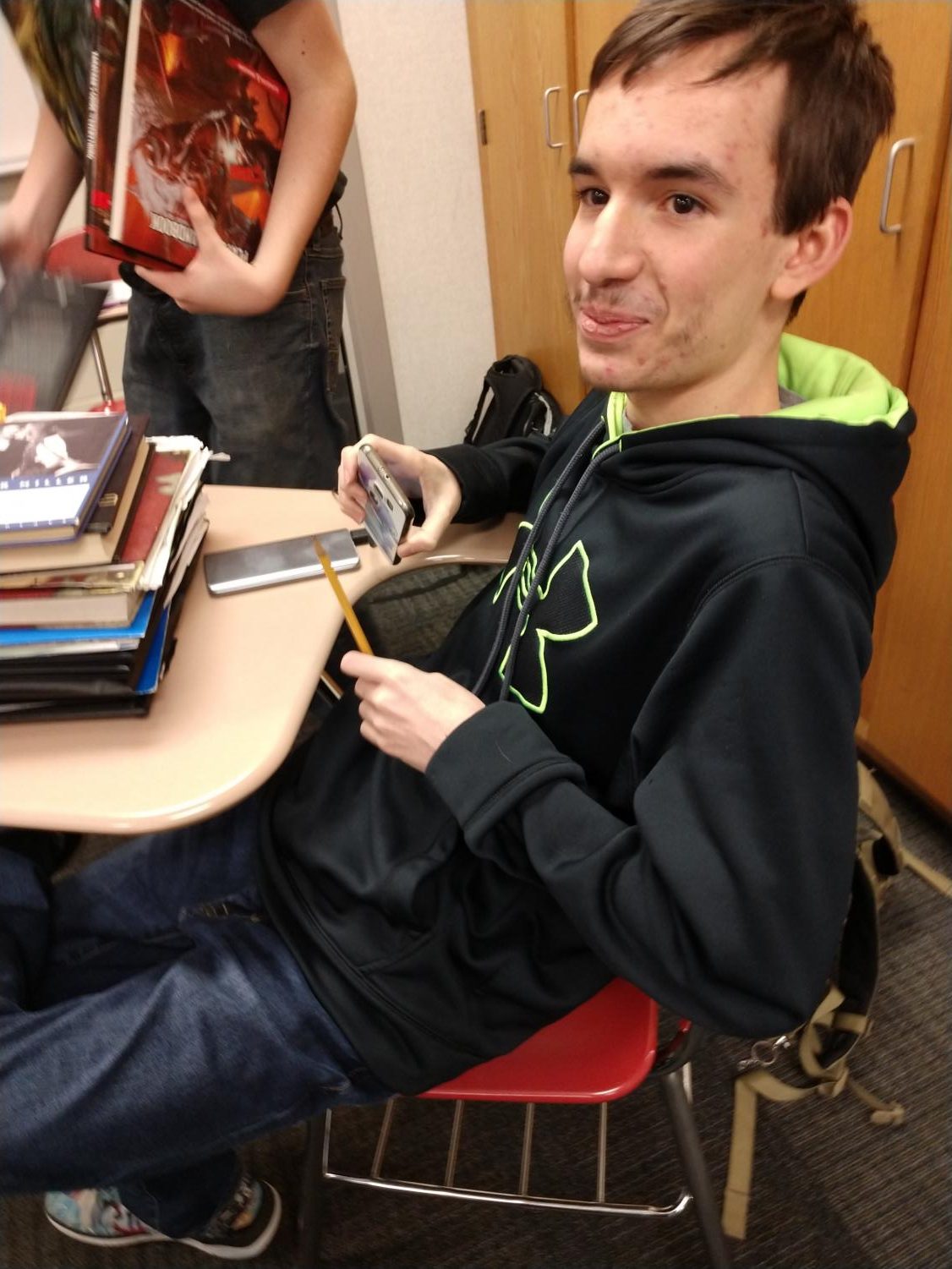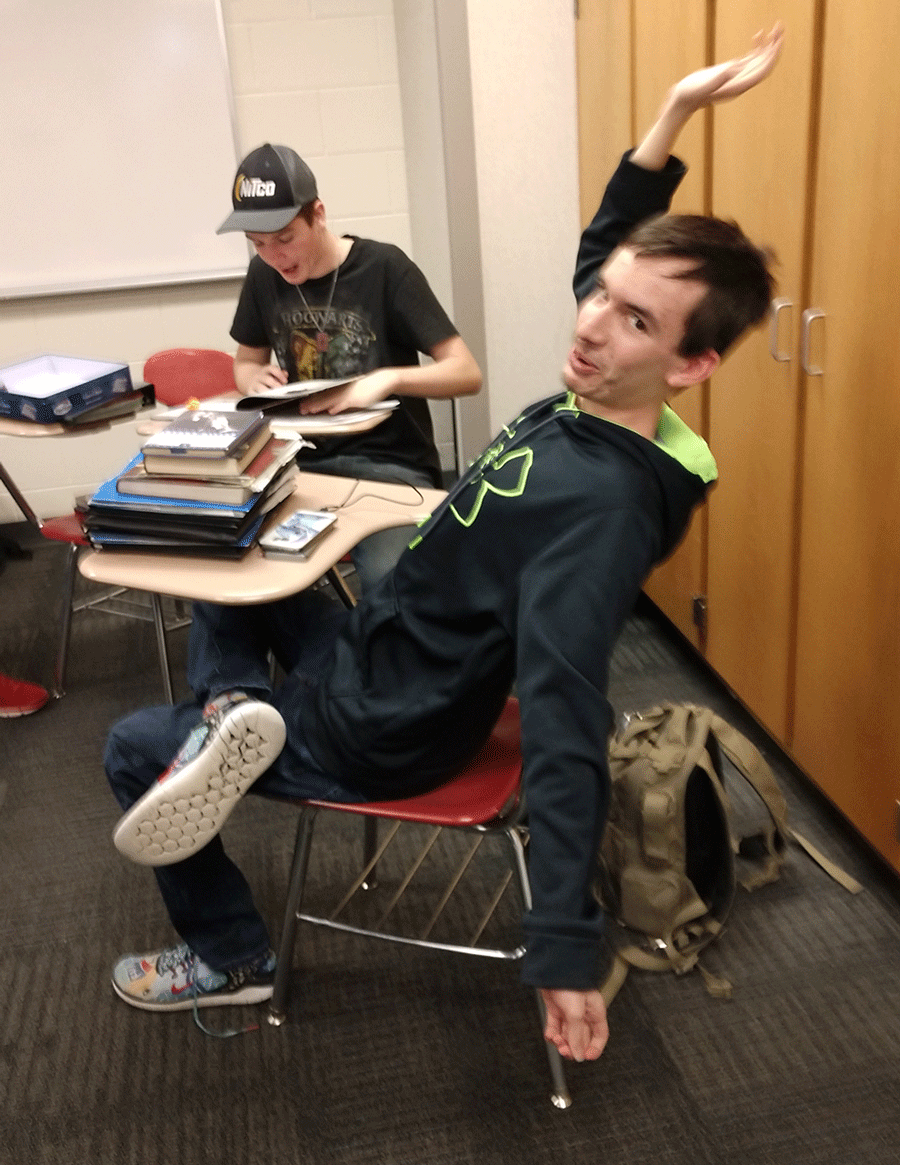Meet the Master of Dungeons. A Creator of Worlds. A Fantasy Writer Extraordinaire.

Junior Quinten Miller finishes up his Dungeons and Dragons campaign after school during a recent game session.
To the rest of the world, junior Quinten Miller is an average high school student with a bit of an interesting philosophy. To the Dungeons and Dragons (D&D) club at school, however, Miller is a Dungeon Master.
Now wait. Before you click off because D&D is “nerd stuff.” Stop. Read on because there’s more to it than you might think. (And besides, D&D is what the boys in Stranger Things were playing, so it must be cool.)
Plus, it actually helps the people in the club, like Miller, be something more than what they already are.
So what is it all about?
Dungeons and Dragons is a fantasy role-playing game that tells a story through the Dungeon Master’s writings. You, as the player, get to make choices that impact not only you but the entire story or in D&D lingo: campaign.
Miller said when he was younger his imagination toward the science fiction aspect rather than the real world. It interested him because his active imagination was random, and it helped him realize he has an eye for the extraordinary.
“My imagination was very random,” he said. “It added to my interest in Dungeons and Dragons.”
So how did he get started?
“I was looking for something to do,” Miller said. “I had some friends that got me into it, and I was like ‘oh this seems like a pretty cool game. I guess I’ll go and join.’”
Since his imagination is still pretty random, it gave him that “interesting philosophy” he is known for. Without it though, Miller would have never created his first D&D character.
“[My first character] was a monk,” Miller said. “He was basically the healer of the team, preferring to never fight unless he absolutely had to.”
In each of the sessions, players make or have a character representative of themselves. That character is almost like a role in a choice-based play. Whoever you create is whatever you can imagine and put yourself in the place of.
There are different kinds of characters a player can be: from a rogue to a sorcerer.
As the Dungeon Master, Miller gets to craft a story based on anything he can think of while the player gets to make the choices that form the outcome of the story. Each player plays that session as his or her character. The choices each player makes directs the plot of the story.
Miller recalls the most interesting story he wrote.
“It’s sort of like any other campaign [or story] except that this one is smashed full of pop culture references like Dr. Who and RWBY,” Miller said.

Quinten Miller strikes a pose at the end of his campaign. His group, which includes freshman Artie Adams (pictured with Quinten) solved a difficult cipher that Miller made.
Miller recommends Dungeons and Dragons to people if they like fantasy, sci-fi or the unusual. If a person wants to have a fantasy adventure, they should give it a try.
What Dungeons and Dragons is, really depends on the person and how they play. To Miller, it is a new form of identity.
“[It’s like] becoming something that you can’t really be in real life,” Miller said. “You have to make a character who you feel best would be good for the campaign someone is running. And basically, you listen to [the Dungeon Master] and roll dice.”
As you play the game you will encounter chances to attack an enemy. This is when you would pull out your dice to see how much damage you can do on the enemy.
“Depending on what kind of weapon you have,” Miller said, “you either roll a d6 [A six-sided die] or a d8 [An eight-sided die].”
A lot of the time, this can help the group think of the game more logically.
“In my game, it’s more like solving puzzles than fighting,” he said, “but the best part is making an absolute god character for your party members to be scared of.”
Of course, there are certain limits to what the Dungeon Master really does.
“The Dungeon Master is really just there to give you an outline. The players are the ones that move the story,” Miller said. “All I really do is sit back and make sure they follow a certain path so their characters don’t die.”
This storytelling has helped Quintin with a lot more than having a good time. D&D has become a big part of Miller’s life.
“I have to go by people’s social interactions, make new friends, and be able to write a story and make it so that people don’t get bored easily,” Miller said.
His favorite part of D&D is how much he can observe and learn.
“You can learn a lot about someone by the way they play,” Miller said.
Miller has his own mindset as he creates the story for his adventurers. He has a consistent amount of people who want to be in his campaign.
“If you can’t write a story, and nobody is interested,” Miller said, “well then… what are you doing?”


